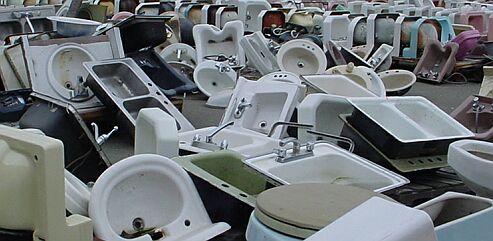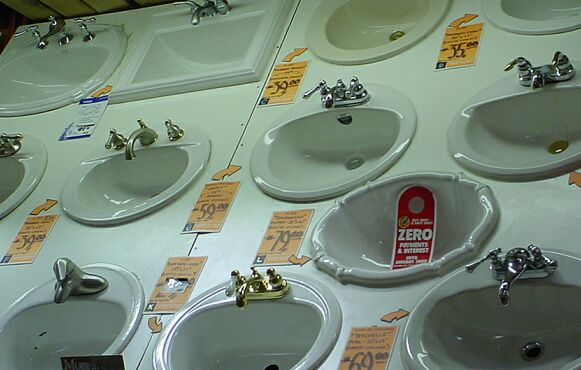What does
Overcoming
consumerism accomplish?
It is a means by which one can live a good yet more
environmentally benign life, while improving their community, gaining
time for family and friends, saving money, shrinking the number of and raising the value of
their possessions.
Overcoming consumerism can also mean survival for your sanity,
economic health and, long-term, the survival of you and those that
you influence when the systems based on the use of unsustainable
resources begin their imminent decline as they have with collapsing supply chains and unavailability of even simple items like masks.
Consumerism has been imposed on our lives, society, economy and our
environment layer by layer. It can be removed one
layer at a time. Small everyday changes are easier to implement than
a broad philosophical revolution, but lead inexorably to that
same outcome.
You vote for the kind of economy, society and environment that you
want every time you spend the ballots called money. Vote for
yourself and for your future by spending carefully and wisely, or
when appropriate, not spending at all.
WHY OVERCOMING CONSUMERISM MAY EQUAL SURVIVAL
People who fill their intellectual horizons with nothing beyond sports statistics and exquisite attention to their personal appearance, who know nothing of real matters such as growing food, repairing things and asserting their independence from mass culture are in for a rough future. A quiet disaster of seemingly unconnected changes will overwhelm their expectations, hopes and transient security. Their children will live in poverty and the world of their parents and grandparents will be unobtainable to them. |
|
People concerned with the subjects of this site and others like it are in a much better position to survive the timeless changes that are occuring:
Here's a great primer if you're unfamiliar with the subject of Peak Oil:
It is in the overall reduction of demand for socially destructive products and services that the greatest effects of overcoming consumerism are registered. Anything that takes away from the sales of non-sustainable enterprises is a good thing, whether it transfers the demand to sustainable businesses or simply causes the demand to disappear. The only way that corporate America is going to recognize and acknowledge that their policies are ruining lives, the environment and society is when their sacred markets start to disappear and sustainable competition grows. Overcoming consumerism helps lead to this. 
How to practice Anti-Consumerism
Buying merchandise from sustainable industries and businesses is
important but merely substituting an exorbitant lifestyle of
unsustainable goods for an exorbitant one of Green merchandise may
make the purchaser feel good but it is not going to seriously reduce
the scope of the problem.
It is simply not possible to carry on at the current level of economic activity without destroying the environment
Corporations and marketers are getting smart. They are tacking "green" labels and "fair trade" stickers on all manner of their products the do not deserve the label. "WE'RE GREEN!" Has about as much significance as
"FOUR OUT OF FIVE DOCTORS SMOKE CAMEL CIGARETTES."
Our programmed fascination for new shiny goods to replace old standardized commodities has long been a social pathology in a system
that breeds mental divisions among individuals to deny the existence of social structure. The Seven Deadly Sins are now used
by advertisers to sell goods. i.e. "Drive an S Class Mercedes and you will be envied."
The best method to overcome consumerism is to question one's true need for all items purchased new. Ask yourself, can an old item be repaired, or a substitute borrowed, rented or bought used? If you must buy new, can you wait for the item to become "last years model", thus saving money and turning planned obsolescence against itself?
If purchasing new items, the lowest cost to both the purse and the environment is a quality product that lasts, yet can be eventually repaired if need be. Before buying a new item that you personally may not use up or wear out over the life of the product, determine whether there is a secondary market for the used product and whether the material it contains can be recycled when it ultimately does wear out.
When there is a choice between products, buy those made as close as possible to home to help keep our communities working and preserve wealth here. Determine if the item is manufactured in the U.S, Scandinavia or Western Europe, countries that usually offer a high degree of protection for their workers and the natural environment when compared to other sources, especially China.
Buying goods made in your state or local area prevents the
squandering of fossil fuels used to transport goods long distances
or, in the case of out-of-season fruit, airfreight it from South
America, where pesticides, finally banned in the U.S., are
indiscriminately applied in the quest for perfect appearances and
"marketability."
Impulse buying is a handmaiden of consumerism. People are forced to
acknowledge the worthlessness of gift shop junk when they attempt to
raise cash by selling at garage sales the little novelties, gift items,
impulse buys and "collectibles" of yesterday.
Worse, is the compressed sawdust "furniture" that people buy and then when finished with it, attempt to sell, usually proclaiming the invented name for it. Even more pathetic, people that try to sell used items at a high price and bleat out "We paid $4,000 for this!" basically proclaiming that they are suckers.
![]()
Now You didn't try clicking that link did you?
Research purchases and reflect on the true need of an item before
buying it. Do take advantage of large corporate owned
advertising-driven stores to shop for and examine items but then buy
or order them from a locally owned independent store if possible. Big
price difference? Ask the smaller store if they can partially lower
their price to get the sale. Always pay cash to small businesses to save them the credit card company skim that may cost them most or all of their profits. Example: Buy a $100 dollar item with a credit card and the merchant gets back $95 from the card issuer.
|
BUYING, TRADING OR GIVING AWAY USED GOODS.
Destine your possessions that are no longer actively being utilized
to those who can actually use them. There is an enormous amount of
unwanted, unused and under utilized goods stored in closets,
basements and garages. Take inventory of your household possessions
and get these things to those who can actively use them. This creates
wealth for the giver sometimes in the form of money, but always in
storage space, less clutter, plus the goodwill of the recipient who
obtains useful items at little cost. Determine what's underutilized
in your home. For example: Consistently return clothing that you have
just worn or laundered to the far right side of the closet bar. This
gradually pushes the clothes that you never wear to the far
left hand side of the closet. After a year or so you will have
lots of clothes covered with dust on the left. Give them away to
someone who can use them.
Each item that you give away can take the place of one yet to be purchased and thus you have prevented the shrinking of inventories and the squandering of the embodied energy and material that would be used in the manufacture of the new item. Just about every thing that you need except for food and fuel is probably sitting unused and unwanted somewhere. How to determine where it is and obtain it is always more difficult than destining your unwanted items to others. Here are some solutions to this.
If you and your neighbors pool your resources and material goods, a tremendous amount of energy, money and time can be saved. For example, a neighborhood, or community wide lending library of tools is easy to set up and eliminates the duplication and expense of everyone having their own rarely-used tools.
Setting up a community wide exchange service based on category and (clothing) size is now practical with widespread use of home pages, community bulletin boards and servers. Search Yahoo for their list of Freecycle groups. Craigslist has free, barter, trade and specialized category listings for almost every urban area in America.
Spending money in a way that keeps people working instead of consuming more resources is another means of fighting consumerism. Consider practical repair before replacement. When there is an alternative, refuse to use ATM's, automatic ticket/boarding pass issuing machines and other automated job-destroying technology.
Our local Safeway has more and more "self check out" lanes with fewer and fewer checkers. Notice also the charitable giving scams in corporate markets these days. "Do you want to donate to XYZ charity?" The reason they do it is free publicity and most importantly, the corporation gets the charitable donation tax write off using your money, which you might pay with a credit card that charges you 29% interest. We patronize a local market with workers who we know and who are delightful, well paid and have a job for life if they want it.
Contrast that with the victims of these policies: "Over 40 million Americans have lost their jobs since the start of the Covid-19 pandemic. Meanwhile, corporate CEOs are doing just fine. The average compensation of CEOs at companies in the United States is over $12.3 million. CEO compensation has grown 940% since 1978."
When calling a company say "OPERATOR, OPERATOR" as a way to often get out of voice jail. All that is stopping
companies from completely automating or exporting telephone service
jobs is customer resistance to this practice.
How to get through to a real live human for many companies.
Ask the next order-taker or service representitive that you deal with on the phone: "Where are
you actually located?" Odds are that they are across the country or
perhaps overseas. Ask the people whom you are dealing with if they're being treated fairly by their employer and getting benefits, that you are on their side etc. They'll appreciate it and
management will sometimes hear about it on recorded lines. Refuse to buy from companies that
export or destroy service jobs. Here's an example:
America's biggest job and livelihood destroyer, after Congress. How many of the 23,328 employees that AT&T will layoff, as well as their friends and family are still using AT&T as their service provider? None we hope.
And "In addition to the 1,800 job cuts, a CWA analysis from May showed that AT&T has cut 23,328 jobs since the Tax Cuts and Jobs Act was passed near the end of 2017. AT&T CEO Randall Stephenson was a proponent of the tax cut, and said it would lead to the creation of at least 7,000 jobs.,, The company's own numbers show that they employ 23,000 fewer people today than they did at the start of 2018. There's plenty of work to be done if AT&T would invest in maintaining its existing network and making sure that next-generation networks reach every community that they serve."
Learn
about the corporate hero who laid them off. AT&T CEO receives massive $274k salary a month FOR LIFE.
Ask yourself, has AT&T gotten less expensive than it was before the job cuts? ***********************************************
Pay cash whenever possible. MORE PROFITS ARE MADE FROM SELLING MONEY THAN FROM ANY OTHER LEGAL PRODUCT. Banks borrow money for near zero percent from the private federal reserve bank and then turn around and lend it to you at 29%. And this after the banks got Trillions in bailouts from the taxpayers. How's that for a scam?Credit card companies were for many years blatantly issuing cards to anything that moved, including dogs, (see the example below), and then lowered the minimum payments on cards so that people would take far longer to pay off balances and thus pay more interest over the life of the debt.
{a friend of ours objected to paying .50 a month to have his new phone line unlisted so he had them list it in the name of Scruffy, the family dog, followed by the their last name.
Several weeks later an official letter arrived from Visa.
He made a mark on the signature line and now scruffy has his own credit card that is clipped to his collar.
If you must use credit cards, pay off your balance each month and ask your credit card company to drop the annual fee so as to "remain globally competitive" or "compete" or switch to those companies with no annual fee. Consider those credit card companies that give something in return to good organizations of your choice rather than just points or discounts that lure you into buying more items such as new cars, overpriced vacations and airline travel.
Food, from epicurean to basic, makes the ideal gift. It is totally useful, leaves little waste and may not be subject to sales tax.
WASTE
One can lead a good life through the elimination of waste and using products made by sustainable means. Waste often is found by discovering patterns in how we live, our choice of what to buy, what to consume and what to do with the byproducts.
Waste also can be found in inefficiency, ritualized annual style-changes, and in the cleverly engineered consumer dissatisfaction with what we already have. Waste is in the cheap, short duration products that we buy for convenience or "fun".
Maximum sales volume of products demands the cheapest construction for the briefest interval of durability that the buying public will tolerate. Raise your standards. The individual ownership of rarely used objects is waste.
THE ECONOMY OF REUSE; What can one do to alleviate such consumption and waste while still leading a comfortable, productive life? Simply stated, every item that passes through one's hands should be utilized to its maximum. Items are useful if they have any utility or recyclable material left in them. Treat every serviceable item that one discards as a potential resource that can be used somehow. Recycling is part of this, destining items to others for reuse is another. Making do with an old item adapted for a different use is an intellectual challenge and can be far more satisfying than spending money for a new item.
 |
|
|
Urban Ore, Berkeley, California. Millions of used items, often American made and of high quality -inexpensive. |
Home Depot. AnyWheresVille. High prices-high interest rate credit available for cheap crap not as good as what's in a junkyard. |
The time out of your life, the labor it takes to earn the money before taxes to buy a new item will not be wasted on buying newness. The time and money saved can be used for more useful activities such as education, leisure and savings.
EDUCATION is the heart of overcoming consumerism. The sooner an alternate economy of sustainable practices develops, then the sooner we can begin to reduce our destruction of the Earth's natural resources through living our daily lives.
Sustainability means that there is no long term environmental cost to nature in the manufacture of a product or the provision of a service: the base materials from which such products and services are made and provided can be replaced in a reasonable period of time by natural processes. i.e. Oil is not sustainable. Plants are.
Sustainability requires choosing among products that each use a certain amount of energy in the production process, and selecting the one which requires the least energy and contains materials that originate, biodegrade and are replaceable by nature in a reasonable amount of time. Sustainability means that one learns the origins and production processes of the goods and services one buys. This requires eliminating complacency and actively learning. This usually leads to a savings of money as well.
Ask where the things that you consume originate? Do they come from halfway around the world, using up fossil fuels in their transport, or do they come from nearby? Who makes them, how are they made, what is used? Do you invest in quality items that will last a lifetime, made by skilled workers earning a decent wage in your community, state or country or do you buy items made by child-labor or near slave labor that cost less, but will be thrown away, broken, worn-out or rendered "unfashionable", within a short time?
These are simple, everyday ways to overcome consumerism.
The next Link outlines stronger means of resistance.
Active resistance to Consumerism
Click
here to tell a friend about The Overcoming Consumerism
website
******
Overcoming
Consumerism Index
; Consumerism's
bad effects
O.C. Accomplishes? | Active
Resistance
Hands
on methods
2
Families compared
our
personal consumer choices
consumption
chart
resources
to overcome consumerism
radical
anti-consumerism
cars
How
to raise food
How
to raise trees
eliminate polystyrene products
Corporate
officers and their interlocking interests
Please feel free to link your web pages
to www.verdant.net
e-mail :

***

